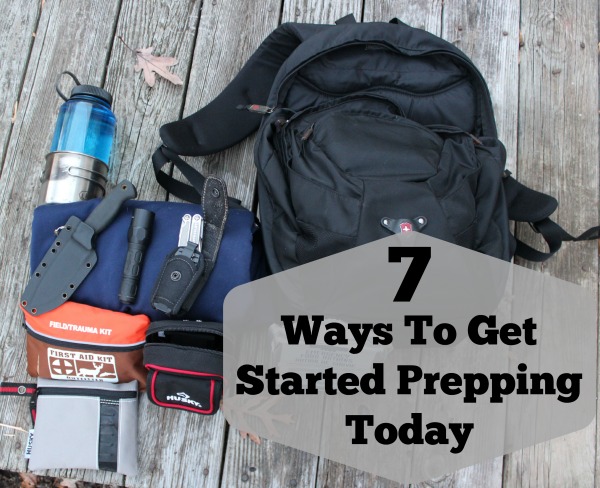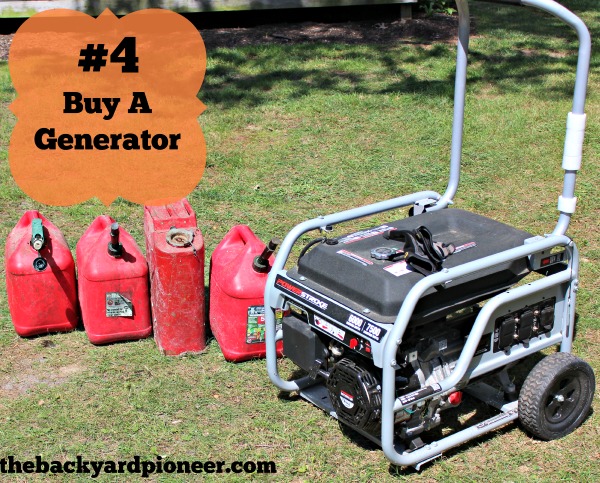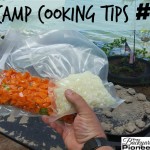7 Ways To Get Started Prepping Today
When most people decide that it is time to take charge of there family’s security and preparedness, the first resource that they turn to is the Internet. This can be both good and bad as the entire gamut of the Prepping world is on display all from the comfort of your couch, and the entire Prepping world can be a bit, how to put this delicately. . . Bat Shit Crazy at times. While AR-15’s and EOTechs are cool they might not be of much use during the next Ice Storm or Blackout.
#1 Assemble A Black Out Kit
Whether it is a big storm or a drunk hitting a telephone pole, sometimes the lights go out. A Black Out Kit is set up for when things go dark. It has the stuff you will be looking for immediately: a flashlight (the cheap ones are fantastic for this), some spare batteries, a few glow sticks, a candle, and some matches. I have one in each bedroom, minus the flammable stuff in the kid’s room. A few cheap kits like this will get you through the the short term power outages without ransacking the house looking for light!
#2 Put Together A 72 Hour Kit
A step up on the Preparedness scale but still firmly rooted in Common Sense Preparedness is putting together a 72 Hour Kit. This the sort of kit that sites like Ready.gov have been squawking about for years now. A 72 hour should have enough emergency supplies to get you and your family through those crucial first 3 days following a disaster.
A good basic kit will have:
- Non-Perishable and easy to prepare food.
- 3 Gallons of water per family member
- Emergency Radio
- First Aid Kit
- Flashlight and Extra Batteries
- Blankets
. Those Space-Saver vacuum bags make excellent waterproof storage for these.
- Paper plates and plastic utensils
- Candles
- Matches
- Camp Stove
#3 Meet The Neighbors
When it comes to Common Sense Preparedness getting to know your neighbors just make good sense. Neighbors can come together to accomplish a lot in times of disaster. Clearing trees, bringing a load of firewood to the older couple next door, cooking a meal, running an extension cord to the house next door, keeping an eye out for those looking to take advantage of a disaster, or running down to the gas lines together are all good examples of the benefits of a strong neighborhood.
#4 Buy A Generator
Buying a generator is one of the best Preparedness investments you can make. If the lights are out for more than 3 days or so you will be amazed at how much you will crave a little bit of light. A generator just makes everything easier, being able to keep the fridge cold, cook a meal, and take a hot shower are just a few of the things a generator makes possible.
No matter what kind of generator you get fuel will be a big concern. A generator without fuel is just a very large paperweight. Having a few days worth of fuel on hand is a good level to strive for. During Hurricane Sandy the Northeast was hit with crippling fuel shortages and long gas lines, the likes of which haven’t been seen since the 70’s, were the norm. 20 or 30 gallons of extra gas and some restraint with the run times could mean keeping the lights on or being forced to stand in line with a bunch of angry irritable people who are just looking for an excuse to lash out.
#5 Get Started On Food Storage
When you mention Food Storage automatically the non-Prepper begins to think of rows and rows of gleaming #10 cans filling a basement. I’m here to tell you that is a noble goal to work towards but I figure that working towards 30 days of food stored is a realistic goal for most people. By using methods like copy canning, shopping sales, and remembering the old adage “Store what you eat and eat what you store” you can begin right away to build a deep pantry that will see you through 99% of disasters.
#6 Talk About Prepping With Your Spouse And Family
Getting a spouse on board with Prepping is a lot easier if you have some common sense goals in mind. Saying you would like to dig a bunker in the backyard is most likely going to earn you a glazed over look at best and divorce papers at worst. Having a family that can move forward together is much better than one partner prepping in secret!
#7 Go Camping
Getting the family out of the house and into a tent in the Great Outdoors is still the #1 way to get a family ready to face most short term disasters. Plus a lot of emergency gear is really just re-purposed camping gear. Fancy flashlights and lanterns are easier to get past the significant other if you are actually going to use them. Camping also lets you hone all those short term survival skills that will come in handy in the event of a disaster.
Further Reading
Build A Get Home Bag
Affiliate Disclosure: I am grateful to be of service and bring you content free of charge. In order to do this, please note that when you click links and purchase items, in most (not all) cases I will receive a referral commission. Your support in purchasing through these links enables me to keep the content train rolling








Really good list, Mike. Almost none of the official organizations’ lists include a camp stove, and I seriously downgrade them for that. Who on earth wants to eat cold canned food for a few days, especially when already stressed out by whatever the emergency is? It is especially a problem for anyone with kids, but cold canned food just adds a ton of stress to anyone’s life exactly when more stress is not needed. Hot food is important, especially in cold climates in the winter.
Camping: Good for including this one. In my mind, camping is the absolute best way to force yourself to get the basic equipment, familiarize yourself with it, and maintain it in working condition. It also teaches you which pieces of gear are actually useful and which might be a great idea, but the one you have is not so great. I don’t think it matters where one starts: a commercial campground with all the bells and whistles, hot showers, park benches, fire ring, swimming pool, all that stuff, is just fine to start. You still learn how to set up a tent, get a fire going, cook on a camp stove, all those absolute basics. The downside, of course, is that it can be a lot of fun, but we do have to make some sacrifices.
I have mixed feelings about flashlights which use batteries which are not standard in every gas station store. D, C, AA, AAA are still the total standards, and so far I prefer to stick to flashlights, lanterns, and radios which use them. The upside of the less common batteries is that they should force one to stock up rather than kid ones self that they will be available during an emergency. I had a great little flashlight which ran on AAAA batteries. Turns out they are available at places like Radio Shack. Period.
The other upside to the less common batteries is that since fewer people use them, they may still be available after an emergency strikes. So maybe a mix of batteries is the way to go, even if one thinks one’s own inventory should be sufficient.
I’m less sure about needing a generator, largely because of cost and the problem with storing fuel. If one has a gas furnace/kitchen, then hooking straight into that supply takes care of the fuel issue and electricity would indeed be nice to have. One can throw away a lot of spoiled food for the price of a generator, though. On the other hand, if your gas furnace goes off without electricity to power the thermostat, fans, and starter, even a very small generator could be critically important in the winter.
Thanks!
Our generator is like a member of the family! It saw us through Hurricane Sandy and made life a bunch easier. We ran it for 4 hours in the morning and then 4 hours at night. I would bake a loaf of bread in our bread machine, the little guy would watch some tv, and we would all take showers. Then 5-6 hours of quiet and then generator from 5pm till 9pm. It worked out pretty well. Gasoline became a bit of an issue so I now store 30 gallons and have a few empty cans in case there is a big storm on the way.
As far as batteries I’m currently switching to a lot of rechargeable batteries. The new lithiun-ion batteries have incredible power output and can handle a ton of recharging. I have even gone over to Ni-MH batteries in AA and AAA. In a disaster I can charge my batteries when the generator is running.
Mike, thanks for putting this article together. I really like #3 because some people do not even know their neighbors. Yikes, someone down the street with a chainsaw might be your new best friend after a disaster. LOL! I totally agree with the statement “Store what you eat and eat what you store”. My husband and I literally live off our food storage. Now if only we could go hunting…
Glad you liked it Linda. Thanks for stopping by!
FINALLY, a prep list that talks about the real need to be prepared first. Getting through the few days of storms, power outages, flooded areas. Yes major disasters that could last for months or end of the world stuff is scary, but any end of the world stuff will wipe out most of us to start with . I have kerosene heaters and can heat soup or water on top of one in a pinch-sometimes warm tea or soup are heaven sent.
I just had a mini disaster, main heating unit screwing up, caused fridge to stop running (kitchen got down to around 40 or just under) and the water pipe from the well froze (high arctic type winds causing wind chill of lower than 20 below zero and the stone where the pipe goes through the wall was beyond icy and with the main heat down…) so I always keep bottled water on hand and save containers to fill at one of the local free springs and do fill them often and I learned several years ago to go with the “70’s saying if it’s yellow let it mellow and I use a plastic lined trash bag for the paper so I only need flushing with the brown and I have two 5 gal fuel cans that ! bought new just for water (heaver duty that water jugs) that I keep filled in the back of the pantry for just such an occasion. but, BUT if you do not then I suggest double trash bags with a disposable diaper in the bottom, the diaper absorbs the liquid and the bags can be tied off and gotten rid of much easier than a toilet full of @#$#@ and no way to flush you can put the bags under the seat and use that or use a pail and a seat or if you have a old caned chair or folding chair (with a hole in the seat) a pail can go under that or I even found a portable potty (garage sale for $5)for people that had knee surgery and can put the bags in that.
also a few solar powered outdoor lights like for a path, leave them outside or in a window in daylight and have a soft glow for the dark of night with no battery to replace.
Glad you liked this one! I try to keep my writing grounded and realistic. Since 2011 my area has been hit with 2 major blizzards and 2 Hurricanes! Keeping the lights on and the family warm were my biggest concerns.
I ran across your list and thought about when I was younger and learned to can food with my mother. Most of the time we didn’t have to go to the store to get vegetables and that saved a lot of money. It would help me now that I have grown. The ability to get food out of your storage is unbelieveable a part of emergency prep. You don’t have to have a big garden, lot of times extra fruit and veggies were on sale, but now I have plenty for emergencies. Take the time to get familiar with canning.
Thanks for reading! This is the year that I ramp up my canning efforts. I would like to go from hobby canner to serious food preserver.
Like your site, great info.
Thanks Pamela, I’m glad you like it.
I live in the UK and I find this website more helpful than most of the sites based in the UK